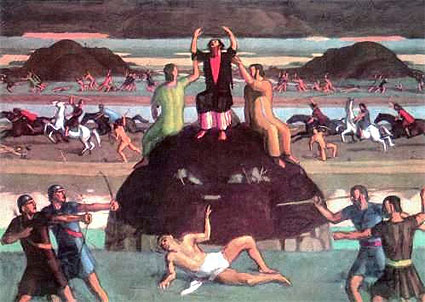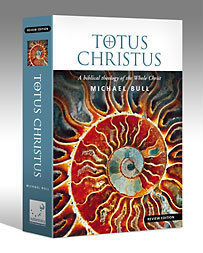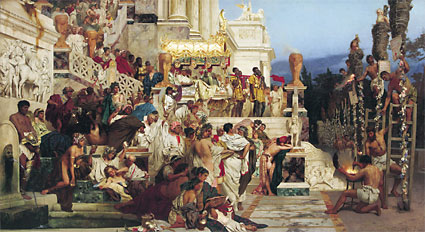Apr
10
2009

“While he languished in prison, Joseph had no idea what was going on in Pharaoh’s heart. He did not realise that God the Holy Spirit was at work making Pharaoh dissatisfied. He did not know that one night God would bring His Word to Pharaoh and Pharaoh would need someone to interpret it. He did not know that one day his suffering would be rewarded, and he would stand before the king of the earth.
This should encourage us. We pray for our rulers and those in authority over us, but we don’t see them change. We have no way of knowing, however, what God may be doing. Our God is still the “God of Nightmares”! In our secular humanist society, Christians are often “in prison” in various ways. Yet God’s Word is faithful, and the time will come when secular society will turn to God’s people for help.
May we be ready for the day we stand before kings.”
- James B. Jordan, Primeval Saints, p. 140.
Comments Off | tags: Bible history, James Jordan, Joseph, Pharaoh | posted in Biblical Theology, Quotes
Apr
10
2009
Attack from the Abyss

As with most things in the Bible the pattern begins in Genesis.
Unlike the serpent’s warriors, who live by the sword, God’s warrior is a father-ruler who fights only to protect those in his care. Nimrod was a serpent-king—a dragon; Abram was a servant-king, God’s answer to Nimrod the ‘rebel’ (most likely Gilgamesh).
Satan’s attack on ‘the offspring of the woman’ through Pharaoh had failed, so he resorted to inciting a conspiracy of nations. The serpent became a dragon. But Abram (as a good Gilgamesh/Nimrod), along with the men of his household, defeated them, rescued Lot and his family, and very importantly, plundered the attackers. The darkest nights that God allows are always opportunities for more glory. And, this being HOLY war, Abram refused the ‘devoted’ plunder.
The next instance involves Amalek, who attacked Israel in the wilderness, and mercilessly picked off the stragglers. Once again, God’s man “came down” to fight – in Joshua, at Moses’ command – with Moses, Hur and Aaron as Ark and cherubim on the holy hill, the “garden gate”.
“The Lord will have war with Amalek from generation to generation.” (Exodus 17:16)
This statement about Amalek is more loaded than it seems. Amalek was defeated, and the plunders from the victory were devoted to building God’s house in the wilderness. We will see this pattern again and again. Each time, deliverance for God’s people is on a greater scale, and the defeat more catastrophic for His enemies.
Comments Off | tags: Aaron, Abraham, Amalek, Genesis, Holy war, Moses, Nimrod, Pharaoh, Tabernacle | posted in Against Hyperpreterism, Biblical Theology, The Last Days, Totus Christus
Apr
10
2009
 Nebuchadnezzar fought hard against historical Tyre, but was not able to plunder it. Was Ezekiel wrong? Or does Ezekiel’s prediction of Tyre’s total destruction support the identification of the subject of this prophesy as Judah? It was Judah whose (bronze) pillars were brought down and her foundations made a bare rock. The Lord would instead pay his faithful Babylonian “servant” with the riches of Egypt (29:19-20).
Nebuchadnezzar fought hard against historical Tyre, but was not able to plunder it. Was Ezekiel wrong? Or does Ezekiel’s prediction of Tyre’s total destruction support the identification of the subject of this prophesy as Judah? It was Judah whose (bronze) pillars were brought down and her foundations made a bare rock. The Lord would instead pay his faithful Babylonian “servant” with the riches of Egypt (29:19-20).
The imagery of Pharaoh’s descent to Sheol in chapter 32 has the Exodus in mind. Egypt’s armies would be swallowed by Babylon in the way Pharaoh’s armies drowned in the Red Sea. All the uncircumcised nations would welcome him to hell, and Egypt is the last army to be drowned and made unable to cross over into the new world the Lord was creating.
Of the imagery reprised in Revelation, the foremost is that of a dragon of the Nile, most likely a crocodile. Pharaoh thought he was secure in the fertility of the river, but the Lord would put hooks in his jaws and throw him into the wilderness. The crocodile would be food for birds and beasts, a Covenant curse. Ezekiel is once again making a veiled insult against the king of Israel, using Pharaoh’s behaviour as an object lesson. Israel’s mission was to bring the river of life to the nations but she had instead brought them harm. Like the real Egypt, the nations had leaned on Israel as a crutch, and she had only brought them injury. For this, Egypt/Israel would be made desolate, then restored from captivity. But because she had usurped the Lord’s throne, she would forever be a vassal kingdom.
As Tyre, Solomon’s gold was stolen by foreigners. As Sidon, his oppressive taxation was cut off. And as Egypt, his many wives were taken captive and the horses he had imported from Egypt were finally drowned in the sea. The word of the Lord is sure.
Comments Off | tags: Babylon, Ezekiel, Nebuchadnezzar, Pharaoh, Revelation, Tyre | posted in Biblical Theology, Totus Christus
Apr
9
2009
And the LORD said, “Arise, anoint him, for this is he.” Then Samuel took the horn of oil and anointed him in the midst of his brothers. And the Spirit of the LORD rushed upon David from that day forward. And Samuel rose up and went to Ramah.
Now the Spirit of the LORD departed from Saul, and a harmful spirit from the LORD tormented him. And Saul’s servants said to him, “Behold now, a harmful spirit from God is tormenting you. Let our lord now command your servants who are before you to seek out a man who is skillful in playing the lyre, and when the harmful spirit from God is upon you, he will play it, and you will be well.” (1 Sam. 16:12-16)
Does God send evil spirits? …
Continue reading
Comments Off | tags: Babylon, Covenant curse, David, Herod, Jeff Meyers, Pharaoh, Satan, Saul, Temple | posted in Biblical Theology
Apr
8
2009

“…since we have so great a cloud of witnesses surrounding us…” (Hebrews 12:1)
NOTE: THIS POST HAS BEEN REMIXED AND INCLUDED IN GOD’S KITCHEN.
To defeat Satan is to expose his lies to the truth – to unmask him. We see lots of unmaskings in the Bible. Many of these use the saints as bait. The true natures of Pharaoh, of Job’s accusers, and of Haman and the enemies of God in Esther were all exposed when God’s people became weak. A corpse always brings out the dirty birds (Matthew 24:28), the ‘Edomite’ false brothers waiting to loot a razed Jerusalem.
Continue reading
1 comment | tags: James Jordan, Job, Nero, Pharaoh, Postmillennialism, Satan, Witness | posted in Biblical Theology
Apr
8
2009
“And another angel came out from the altar, the angel who has authority over the fire, and he called with a loud voice to the one who had the sharp sickle, “Put in your sickle and gather the clusters from the vine of the Land, for its grapes are ripe.” So the angel swung his sickle across the Land and gathered the grape harvest of the Land and threw it into the great winepress of the wrath of God. And the winepress was trodden outside the city, and blood flowed from the winepress, as high as a horse’s bridle, for 1,600 stadia.” Revelation 14:18-20
Like Pharaoh, the “plagues” Trumpet warnings only hardened the hearts of the Jewish leaders. Like Pharaoh, he had raised up the Herods only to demonstrate His power in their destruction (Romans 9:17). Continue reading
Comments Off | tags: 70 Weeks, Altar of the Abyss, Gehenna, Harvest, James Jordan, Martyrdom, Pharaoh, Revelation, Tophet, Totus Christus | posted in Biblical Theology, The Last Days





























